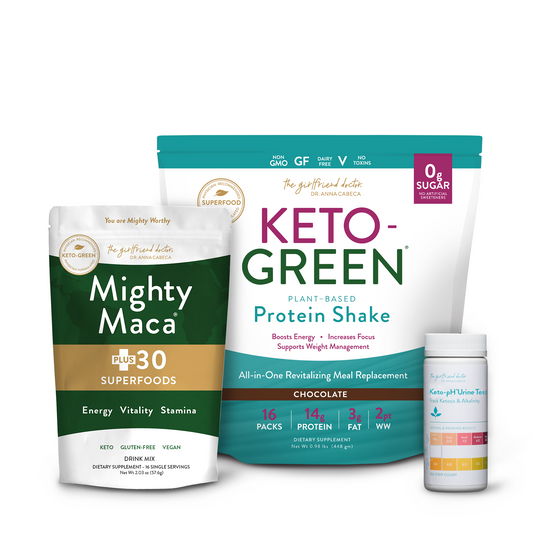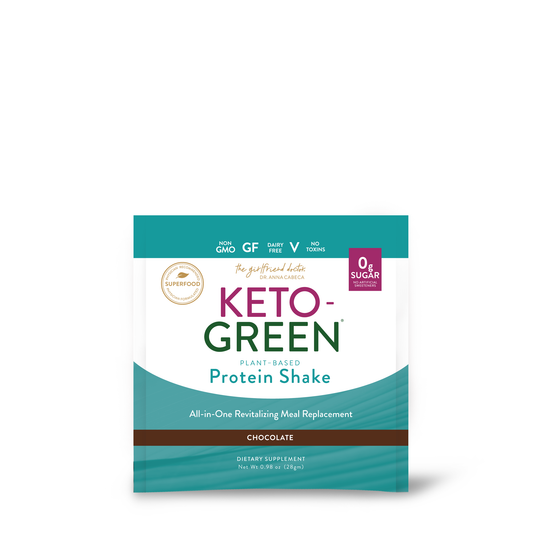In Part 1, I discussed the chemistry behind pH in your body and the differences between blood pH, urine pH and the pH effect that different foods have on your body.
I also provide a lot of research relating to all of the negative effects associated with eating and living an acidic lifestyle. I hope you’ll review some of this, it is very compelling.
Now let’s talk about testing your urine pH. In Part 2 you will learn,
- What your urine pH tells you about your overall health!
- Testing ketones along with urine pH...why you might want to do both
I’m going to focus on the ill effects of having an acidic pH as that is what the majority of people will find when they test their urine pH (due to consumption of the typical Western diet, processed foods, toxin exposures, stress, etc.).
So let’s all put on our Nancy Drew detective caps and test our urine! Testing your urine pH is easy to do...and will look like this. You just look at the color-codes to determine how alkaline or acidic you are and can also measure for ketones.


Note that you really want to have more than one test result. Testing daily, even several times a day, for several weeks in a row can shed light on what’s going on with your body.
And once you are trying to maintain a more net alkaline diet, testing can also provide immediate feedback on the effect your dietary changes are having.
When your urinary pH tests as acidic, it can point to:
- Too acidic of an eating pattern, including:
- too protein heavy
- a traditional ketogenic diet (ketones are acidic; a number of studies have shown an association of ketogenic diets with metabolic acidosis) (1)
- It is for this reason that testing alkaline while on a ketogenic diet is so important; on our Keto-Green diet we focus on a dietary plate that provides the benefits of ketones without the negative side effects.
- that you are fasting (again, ketones are acidic), dehydrated or starving
- that you are eating too much processed food or toxin-loaded foods (low mineral, high inflammatory)
- that you have high blood sugar
- that you may have food sensitivities such as gluten (in my women’s restorative health and Magic Menopause programs this is a common culprit in women not being able to achieve a healthy alkaline state, so I routinely have women remove gluten at the start)
- Electrolyte depletions and unhealthy mineral ratios potentially impacting your cellular and overall health - A few examples: low potassium along with higher sodium can result in hypertension; citrate deficiencies can be a risk factor for kidney stones; low magnesium and potassium levels can affect sleep and circadian cortisol regulation.(2) Acidic diets are associated with low magnesium levels. Magnesium is probably one of the most important minerals that most of us are often already deficient in. Magnesium deficiency has been associated with many inflammatory conditions including osteoporosis, hypertension, cardiovascular disease, metabolic syndrome, Type 2 Diabetes, insulin resistance and even cancer. Magnesium deficiency also impacts Vitamin D activation, which is needed for immunity as well as bone health. Magnesium is also vital for optimal function of many important enzymes. (3-6)
- Dehydration
- Prolonged exercise (on top of an acidic diet this can stress acid-buffering systems)
- Medication or toxin overload
- Kidney issues (acidic pH is a risk factor for uric acid stones, calcium stones)
- Too much cortisol and circadian rhythm disrupts! Acidic diets can increase the release of cortisol (and incorrectly release it at night), affecting sleep quality; causing cognitive impairments, dysfunction of mitochondria metabolism, and oxidative stress.(7) This elevation in cortisol can be reduced when the acidic diet is neutralized via bicarbonate supplementation or maintaining a low acid-diet.(8,9)
- Glucose management issues. Acidosis has been shown in numerous studies to be a risk factor for having a higher fasting glucose, as well as for developing insulin resistance and even Type 2 Diabetes.(10)
- Chronic stress. Many clients in my Magic Menopause program find that stress management is key to their getting and staying alkaline.
- Lack of positivity, gratitude and oxytocin in your life
- Reduced excretion of ammonia/ammoniagenesis (associated with glucose control and increased risk for insulin resistance)
A bit more about bone health
We know that an acidic diet may result in lower levels of magnesium, and that magnesium levels affect bone health due to its impact on Vitamin D activation. Many people are already deficient in Vitamin D.(11)
So a more alkaline diet supports this aspect of bone health. As stated earlier an alkaline diet is supportive of maintaining lean muscle mass, important for fall and fracture prevention.
There are also numerous studies that have concluded that acidic diets adversely affect bone health by pulling needed calcium from the bone (referred to as resorption of the bone) as an acid-buffering mechanism (on top of kidney and lung acid-buffering actions).(12) These researchers feel that decades of eating a high acid diet might contribute to the loss of bone mass seen in osteoporosis due to this ongoing bone resorption activity.
But there are also opponents to this thinking. And the many studies relating to the effects of acid diets on osteoporosis appear to support “both sides.”
One recent 2018 study tried to meld both sides of thinking by looking at the age of the subjects. They concluded that additional factors such as age (as well as gender, immobility, and race) impacted whether a high acid diet contributed to the development of osteoporosis, as well as whether alkaline therapy would help treat osteoporosis. (13) In older subjects they found lower buffering capacity due to lower muscle and/or bone mass, as well as diminished kidney buffering ability (remember, our kidney acid-buffering capability declines with age), such that a depletion of bone mineral could occur. For this group they also concluded that alkaline therapies could be beneficial in the treatment of osteoporosis.
Note that the important role of protein (even though it has an acidic pH effect on the body) has been studied as well relating to bone health with the conclusion that adequate protein is necessary for the prevention of osteoporosis and sarcopenia (loss of muscle mass); and that protein should not be excluded from the diet. The recommendation is that alkaline foods such as fruits and vegetables be added versus taking away protein, especially in older people. This is in alignment with my thinking in my Keto-Green diet as well. It is all what’s on the “plate” in achieving a net alkaline load (and yes, there is protein and healthy fats along with those veggies!).(14)
Bottom line is that I feel that bone health can be strengthened with an alkaline diet (along with a moderate amount of healthy, quality protein!) due to its proven acid-buffering role, increased levels of magnesium/Vitamin D, support of muscle mass, and proven anti-inflammatory effects.
Bone health is clearly just one health benefit of an alkaline state. And there are many others. But can we have too much alkalinity? What if our urine pH testing comes back very high?
When your urinary pH tests as overly alkaline, it can point to:
- Too alkaline of an eating pattern
- Kidney issues (overly alkaline pH is a risk factor for calcium stones)
- A urinary tract infection (UTI) A urine pH of 8.5 or 9.0 signifies the presence of a urea-splitting organism (urease), or a bacterial infection. A UTI can signal the potential to develop struvite kidney stones (called “infection stones”). (15)
- Low stomach acid (diet can cause this, or another risk factor is an H. pylori infection)
- An outcome of diuretic therapy
- Metabolic alkalosis (blood pH > 7.55)
- Catabolic illness
As I mentioned earlier, most women start my programs with an acidic urine pH. Again, when you “Test, Don’t Guess” you will know so much more than you otherwise would, and can measure changes as well. I’ve had many participants in my programs take their urine pH test measurements to their doctors to have a discussion about their findings! Sometimes this has led to more specialized urinary testing or blood tests which have pointed to specific issues. All of that is a good thing!
(A cautionary note: I am not suggesting women abandon regular check-ups and other recommended testing...urine pH testing is simply a great way to self-test and get a “heads-up” as to when something may be out of balance… Should you have symptoms you should always consult with your doctor.)
Testing ketones along with urine pH...why you might want to do both
I won’t spend a lot of time on ketones as you can read more about ketones and ketogenic diets on my blog.
Briefly, though, ketones are substances in your body that are produced when you are on a ketogenic diet or when fasting (both of which put your body in a metabolic state called ketosis). When your body is in ketosis and producing ketones it is burning fat for energy and is providing you many other health benefits such as helping balance your blood sugar (keeping your body from becoming insulin resistant), reducing inflammation, supporting brain health and more. Ketones are being studied for a possible treatment in Alzheimer’s disease and there is a lot of great research on ketones relating to brain health. Ketones also support a very important process in the body called autophagy (kind of like taking out the garbage within our cellular network, a process that is viewed as anti-aging and supportive of longevity).
And as already mentioned, ketones can be measured as easily as urine pH.
The pH and ketone test measurements provide so much information. And the reason I put the two tests (pH and ketones) together on a urine test strip is based on the importance of both measures in regards to your health. This is especially true when embarking on a ketogenic diet or fasting as they both can have a very acidic effect on the body, resulting in negative symptoms known as the “keto flu!”. Many people feel very ill during the initial weeks on ketogenic diets (and many just stop the diet as well!); especially women over 40, who due to hormone imbalances really need to keep our body alkaline. That’s the foundation of my Keto-Green diet, maintaining an alkaline state while getting into ketosis and producing ketones.
Why the Keto-Green® diet and lifestyle
In my book, The Hormone Fix, I discuss many self-tests that women can take to help provide clues to their health. Testing for urine pH and for ketones in the urine are two easy tests - using a single test strip - that can shed light on one’s health as well as measure one’s progress in making positive health changes.
Women in my programs have tested their urine and found,
“I thought I ate a very healthy diet. Imagine my surprise when my initial urine pH was 5.7! And even after adjusting my dietary plate to be more alkaline I still couldn’t seem to move the test marker until I started focusing on my poor sleep and stress…”
“Many of my friends had tried ketogenic diets and felt lousy…quitting after a few days of nausea. Becoming alkaline, and being able to see the results of dietary changes in my urine pH, was incredibly helpful. When I initially started the keto diet part of the program I felt great, and having one urine dipstick that gave me both pH and ketone info was great real-time feedback.”
“I had no idea that I had blood sugar issues. I couldn’t get my urine pH in an alkaline range no matter what I did. I brought this concern to my doctor who tested my blood and found my blood sugar was out of whack….”
“One of the most interesting findings from testing my urine pH was seeing how much that stress and lack of sleep impacted my ability to test alkaline...it took awhile for me to see this connection, but once I did and was able to start addressing these I started to see great results….
“Once I started testing alkaline the hot flashes and joint pain also seemingly vanished…”
Along with easy self-testing my book focuses on techniques that I have developed that are now known as my Keto-Green® approach, which includes the Keto-Green diet, intermittent fasting and lifestyle changes to reduce acidity and lower long-term risk for inflammation and disease. The book also includes a 10-Day Keto-Green Quick Start plan, recipes and many tools to help you measure and monitor your health and progress. I encourage you to order a copy of The Hormone Fix today.
References:
- https://www.ncbi.nlm.nih.gov/pubmed/17299473
- https://www.ncbi.nlm.nih.gov/pmc/articles/PMC4942871
- https://www.ncbi.nlm.nih.gov/pmc/articles/PMC1855626/
- https://www.ncbi.nlm.nih.gov/pubmed/20536778
- https://www.ncbi.nlm.nih.gov/pubmed/22364157
- https://www.ncbi.nlm.nih.gov/pmc/articles/PMC3155690
- https://www.ncbi.nlm.nih.gov/pmc/articles/PMC4942871
- https://www.ncbi.nlm.nih.gov/pubmed/12388390
- https://www.ncbi.nlm.nih.gov/pubmed/15607573
- https://www.ncbi.nlm.nih.gov/pmc/articles/PMC5641929/
- https://www.ncbi.nlm.nih.gov/pmc/articles/PMC3195546/#B20
- https://www.ncbi.nlm.nih.gov/pubmed/9614169/
- https://www.ncbi.nlm.nih.gov/pmc/articles/PMC5946302/
- https://www.ncbi.nlm.nih.gov/pubmed/18469289
- https://www.ncbi.nlm.nih.gov/books/NBK470195/
P.S. Test, don't guess!
I've found over the years is that the key to real results is keeping track of your progress. Use these Urinalysis Test Strips to start tracking your body's pH so you know for sure if you are on track to healthy fat loss, stable moods and balanced hormones. Get your own here!







